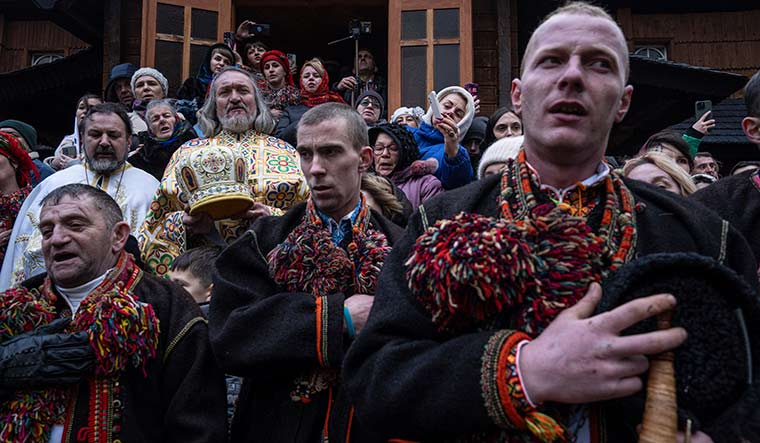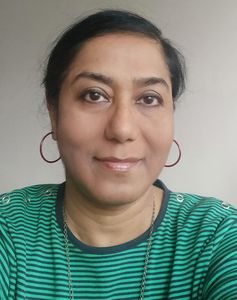ZOYA PAVLIVNA SOKOLENKO, a 61-year-old mathematics teacher and director of a secondary school in Kharkiv, Ukraine, exclaims: “Elections? Are you serious?” I had just asked her what she thinks of President Volodymyr Zelensky’s statement in August that Ukraine could hold elections in 2024, provided that the money for it does not come from the war budget.
Zelensky wanted to not just dispel the assumption of his opponents that he would hold on to power using the war as a reason, but also prove his determination to win the war. Presidential elections are due in March, and parliamentary polls in autumn 2024. But martial law, which is now in effect in Ukraine, does not allow elections to be held. Article 83 of the Ukrainian constitution prohibits the dissolution of parliament when martial law is in effect, and Article 64 restricts certain rights and freedoms.
“There is a full-scale war going on,” Zoya Pavlivna tells me. “More than eight million Ukrainians have fled their homes. Tens and thousands have been killed in 600-plus days of war. Missiles and drones can strike any corner of Ukraine any moment. Almost 20 per cent of the territory is occupied by Russia. Organising elections demands, first and foremost, peace.”
And this is the time of war, not peace. “Oh! Hear the siren? Let’s go to the shelter,” says Zoya Pavlivna. “Will Ukraine be the first country to hold elections in bunkers?”
According to a recent poll by the Kyiv International Institute of Sociology, 80 per cent of Ukrainians are against holding elections when the war is still on. So why the fuss at the top level? Because, during his visit to Kyiv last August, American senator Lindsay Graham said Ukraine needed to show that it was different by holding wartime elections. Interestingly, the Republican senator, accompanied by his Democrat colleagues Elizabeth Warren and Richard Blumenthal, made the statement during a briefing from a bunker in Kyiv.
In response, Zelensky said he agreed with Graham, but he would not take the money for “weapons and give it to elections”. Let the US and Europe take full financial responsibility, he said. Observers, he added, should be sent to the trenches to ensure that soldiers fighting to protect Ukraine’s democracy could exercise their fundamental right to vote. A candid and befitting response, certainly.
Zoya Pavlivna’s life has been in tandem with elections since she started working at the Kharkiv school in 1999. In Ukraine, elections are usually held on school premises and halls on Sundays. After she became the school’s director, she took on greater responsibilities―tidying up the rooms, arranging furniture, setting up polling booths, organising people, coordinating with the territorial representative of Ukraine’s Central Election Commission and ensuring secrecy of ballot.
Zoya Pavlivna says she was proud of working to “honour the choice of the people”. Today, Russian missile attacks have left her school in ruins. She was evacuated to Romania, where she worked as a babysitter, but returned to Ukraine. Today, she teaches mathematics in a school in Chernivtsi.
“We Ukrainians have changed presidents five times since 1991, while Belarus has had the same president for the past 30 years, and [Russian] President [Vladimir] Putin has been holding office since 2000, except for a short gap from 2008 to 2012. People like to have their say in Ukraine,” she says.
As a UN observer, I have seen many elections, including special polling stations, such as prisons, hospitals and military barracks since the late 1990s. Indeed, Ukrainian elections are epoch-making, bringing serious changes, catapulting new faces into politics, although imperfections in party formation, functioning, equal access to media and electoral funding remain.
The rebirth of Ukraine as a sovereign state started with a referendum on December 1, 1991, in which 92.3 per cent of Ukrainians voted for independence and elected Leonid Kravchuk as president. In the 1994 presidential polls, Leonid Kuchma beat Kravchuk. The 1998 parliamentary polls saw the emergence of a multi-party, but oligarchic, system that was consolidated by Kuchma, who was reelected in 1999 amid concerns of rigging. The president’s need for a loyal parliament led to the managing of parties through oligarchs. The degree of presidential control, however, had been decreasing over the past decades gradually.
Russia never missed any opportunity to have a candidate loyal to the Kremlin in Ukraine. “The poisoning of presidential candidate Victor Yushchenko in 2004, and the subsequent massive rigging of elections, were covert operations of the Kremlin,” says Zoya Pavlivna. “Putin congratulated his favourite, Victor Yanukovych, even before the results were announced. People rose in protests and forced the authorities to ensure a fair election.”
Since then, brazen rigging is not usual in Ukrainian elections. In 2010, Ukrainians voted Yanukovych to power. Though seen as a pro-Russian, he pledged to sign an association agreement with the European Union. But he backed out under duress from Putin, and faced another uprising―the Revolution of Dignity. He abandoned office and fled to Russia in 2014. For Russia, the stakes became so high that it occupied Crimea and started covert warfare in Donbas.
The presidential and parliamentary elections in both 2014 and 2019 were freer and fairer than previous ones. The crucial point is, Ukraine remains a democracy committed to free speech and choice.
But attempting elections now would be unfair. More than 100 organisations recently signed a petition against holding wartime elections. Said Olha Aivazovska, author of the petition and Ukraine’s top election expert: “Ukrainians are very sensitive to double standards. Polls now will neither be free nor fair, and will destabilise the country and offer ways for Russia to be more aggressive.” Ukrainians are more worried about Russia organising its presidential elections on the occupied territories of Ukraine, intimidating and using people as electoral fodder.
Listening to many others like Zoya Pavlivna, I saw solid unity on this issue. When politicians across the world think of winning elections, politicians in Ukraine are, in unison, thinking of winning not the elections, but the brutal, genocidal war on their country.
Mridula Ghosh, formerly with the UN, is based in Kyiv, and teaches at the National University of Kyiv Mohyla Academy.



